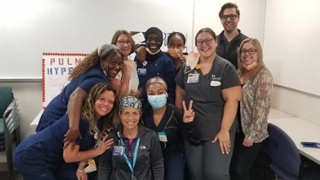A Win-Win Partnership for Technology-Dependent Children and Nursing Students
Published on
Published on
 This past summer, CHOP’s Progressive Care Unit (PCU) and Nursing Professional Development (NPD) department collaborated with the Pennsylvania Institute of Technology (PIT) Licensed Practical Nurse Program (LPN) to pilot a program to provide PIT LPN students clinical training in the nuances of caring for technology-dependent children.
This past summer, CHOP’s Progressive Care Unit (PCU) and Nursing Professional Development (NPD) department collaborated with the Pennsylvania Institute of Technology (PIT) Licensed Practical Nurse Program (LPN) to pilot a program to provide PIT LPN students clinical training in the nuances of caring for technology-dependent children.
Progressive Care Units—found in hospitals nationwide—provide care to hospital patients who need more monitoring and assessment than patients on the medical/surgical floor, but whose conditions aren't so unstable that they need to be in the Intensive Care Unit. The Progressive Care Unit at CHOP specializes in caring for tracheostomy and vent dependent children.
“These kids [PCU patients] have disease processes occurring—whether it's cardiac, GI, neuro, etc.— and they are technologically dependent, so their care comes with unique complexities,” says Laura Fanelli, MSN, MEd, BA, BSN, RN, a clinical nursing and lab professor at PIT who has over twenty years of professional teaching experience. “You always need to be on your toes.”
The collaborative program gives PIT’s LPN students hands-on clinical experience in higher levels of care that isn’t always common among practical nursing programs, according to Corey Dennis, PIT’s Director of Nursing, Practical Nursing Program.
“It really helps these (PIT LPN) students understand higher levels of care and the fact that they can use practical nursing to elevate their skill level. We hope it helps inspire them to continue the growth of their careers into registered nursing and on to advanced practice nursing.”
The benefits of this collaboration extend all the way to CHOP’s patients and their families. Currently, a lack of highly qualified nursing professionals who can care for technology-dependent children once they are discharged to their homes means that babies born prematurely sometimes remain in the hospital for their first, and even second, birthdays—their parents with them the entire time.
The CHOP PCU-PIT partnership is creating a pool of highly trained LPNs who will be able to provide much needed in-home care for these patients, allowing them to reach developmental milestones more quickly while they thrive while in the home setting surrounded by loved ones and consistent caregivers.
“This partnership enables us to build a bridge of continuation of care to bring technology dependent children home and eliminate or minimize readmissions to the hospital,” says Pamela Diehl, CHOP’s PCU Education Nurse Specialist. “The research shows that developmental milestones progress so much faster for patients who are home versus patients in the hospital.”
In addition, the fact that CHOP is stepping up to assist in educating the next generation of nurses is helping to address the challenges of producing enough nurses to fill the current shortage in health care.
“We [PIT] can provide the best didactic education possible on campus. But that's not valuable without the ability to bring students into these clinical settings and have them work alongside professionals in the field,” concludes Dennis.
Diehl concurs: “The nurses on CHOP’s PCU team are experts in educating patients, families and other nurses. They're very willing and eager to teach the PIT LPNs anything they need to know, allowing them to be hands on and welcoming them with open arms.”
“It’s an amazing experience for someone who is in the beginning stages of learning to become a nurse to get to learn in such a fertile environment, to experience what it’s like to provide that [PCU] level of care for children during what is a very challenging time for their families,” says Fanelli. “The LPN students from PIT are so excited for this opportunity—they’ve soaked up information like dry sponges.”
To learn more information, please visit www.pit.edu.
Contact: Kaitlyn Tivenan, The Children’s Hospital of Philadelphia, 267-426-8614 or tivenank@chop.edu